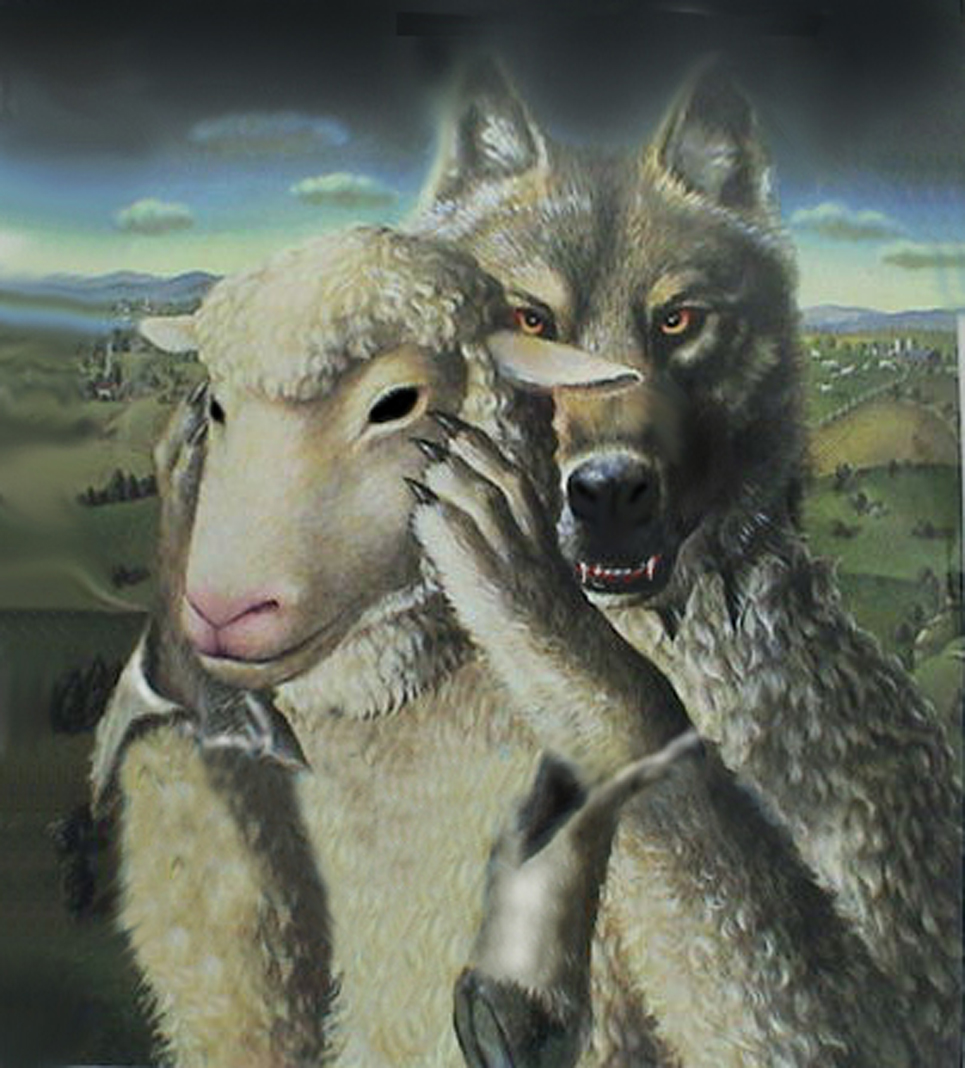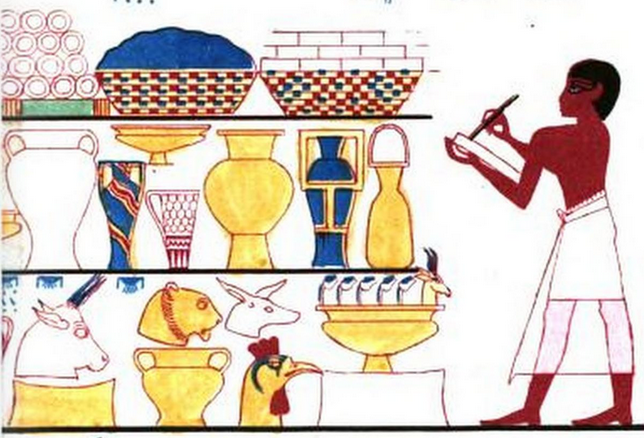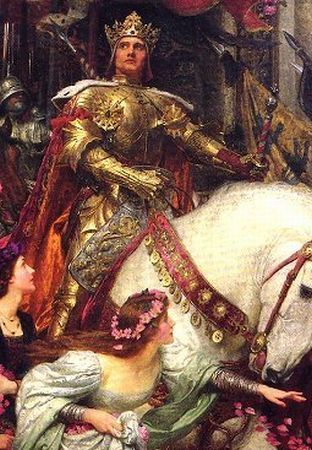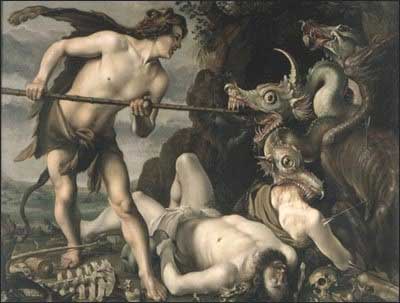 (Sources: Multiple Creative Commons) – Cadmus was a Phoenician Prince who was the founder of the Ancient City of Thebes. He was the person to introduce the use of letters into Greece. The worship of many of the Egyptian and Phoenician deities was also introduced by Cadmus, who is supposed to have come into Greece 1493 years before the Christian era, and to have died 61 years after.(1)
(Sources: Multiple Creative Commons) – Cadmus was a Phoenician Prince who was the founder of the Ancient City of Thebes. He was the person to introduce the use of letters into Greece. The worship of many of the Egyptian and Phoenician deities was also introduced by Cadmus, who is supposed to have come into Greece 1493 years before the Christian era, and to have died 61 years after.(1)
According to the legend, Cadmus, failing to find his sister Europa (Europe), who had been carried off by Zeus, settled in Thrace, and being ordered by the Delphic Oracle to build a town where a cow, which he was to follow, should sink down with fatigue, he founded Cadmea, the citadel of Thebes. He also there killed a dragon which guarded a well of Ares, and, by the instruction of Athena, sowed its teeth, from which armed men, called Sparti (i. e. soxvn), sprung up and slew each other, except five of these beings became the Lords of Thebes.(2)
Ares the god of war took revenge for the death of the Dragon and he turned Cadmus and his wife into serpents.
- The Word Cadmus in Hebrew, signifies One who came from the East
- Descended from (b) Canaan the Son of Ham
- Son of Agenor, king of Phoenicia
- Founded Thebes, the Capital of Boeotia in Est BC 1500
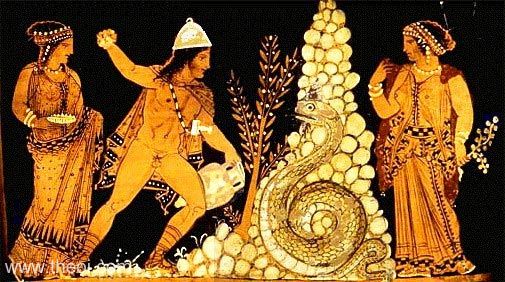
- Among Theban legends, none is more celebrated than the founding of Thebes by Cadmus
- Cadmus was a wise king
- Built a Citadel called Cadmeia
- First schoolmaster of the Greeks
- Taught them the letters which were used in his own country called the first of these letters alpha and the second beta, and that is why men speak of the alphabet to this day.
- The Noble Dragon families of Thebes Descend From Camdus
- Brother of Phoenix, Cilix, and Europa
- Cadmus of Miletus, the earliest Greek historian who wrote in prose. He flourished about B.c. 540. (Plin. Hist. Nat. v. 31; Strabo, i., p. 18.)
- Descendents From Camdus have special birthmark known as the Mark of Cain
His Soldiers the Hivites Mt said to be changed into Serpents, because the fame Word both in Syriack and Arabics signifies a Serpent
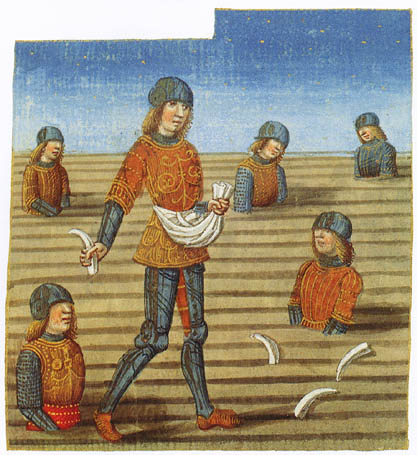 The Word Cadmus in Hebrew, signifies One who came from the East, and seems to determine him to have been of the Race of (a) the Cadmonites, which was a People in Palestina, the fame with the Hivites, who anciently descended from (b) Canaan the Son of Ham. Harmonia deriv’d her Name from Mount Hermon in that Country. Many of these Cadmonites inhabited (s) Mount Hermon, which was the most eastern Part of the Land of Canaan, and signifies the lame, as (d) Tabor lay in, and signify’d, The IVeji. His Soldiers the Hivites Mt said to be changed into Serpents, because the fame Word both in Syriack and Arabics signifies a Serpent. He was the Improver of Brass, and therefore (e) the Stone of which it was made, was call’d Cadmia, and the fame Word in the Hebrew Language signifies both Brass and a Serpent.
The Word Cadmus in Hebrew, signifies One who came from the East, and seems to determine him to have been of the Race of (a) the Cadmonites, which was a People in Palestina, the fame with the Hivites, who anciently descended from (b) Canaan the Son of Ham. Harmonia deriv’d her Name from Mount Hermon in that Country. Many of these Cadmonites inhabited (s) Mount Hermon, which was the most eastern Part of the Land of Canaan, and signifies the lame, as (d) Tabor lay in, and signify’d, The IVeji. His Soldiers the Hivites Mt said to be changed into Serpents, because the fame Word both in Syriack and Arabics signifies a Serpent. He was the Improver of Brass, and therefore (e) the Stone of which it was made, was call’d Cadmia, and the fame Word in the Hebrew Language signifies both Brass and a Serpent.
The Reducing his Army to five, might be taken from the different Sense of the Word in Hebrew, which with a little Variation signifies either five, or (/) compleatly arm’d. The (g) Words which signify Serpents Teeth, may also be render’d Spears of Brass, with which Cadmus was the first, who arm’d his Soldiers in Greece. And therefore the learned Bochart (jj) thinks it probable, that some Phœnician might write of Cadmus after this Manner, He gathered together a compleat Army of Men, who were arm’d with Spears of Brass; and another might translate it in this Manner, He made an Army of five arm^d Men, from the Teeth of a Serpent. By his Wife Hermione he had a Son call’d Polydorus, who succeeded him, and four Daughters, who were call’d Seme/e, Ino, Antonoe and Agave.
He went from Sidon to Samothracia, and from thence into Thracia, and then into that Part of Ogygia, which was since call’d Cadmeis, and now Bœotia, from whence he drove the Hyantes into Phocis, and liibdu’d the Aones. He first built a Citadel call’d Cadmeia, and then a City call’d Thebes, in both which Places he is said to reign sixty two Years, which well agrees with the Age of Moses and Jojhua his Contemporaries. About this Time also his Brother Cilix settl’d in that Part of Asia over against Lesbos, which from him was call’d Cilicia, where he also built a City call’d Thebe Hypoplacia; and soon after his Brother Phœnix settl’d in Bithynia.(3)
When Cadmus went out of the temple, he saw a snow-white cow standing not far from the door. She seemed to be waiting for him, for she looked at him with her large brown eyes, and then turned and walked away. Cadmus thought of what the Pythia had just told him, and so he followed her. All day and all night he walked through a strange wild country where no one lived; and two of the young men who had sailed with Cadmus from his old home were with him.
When the sun rose the next morning, they saw that they were on the top of a beautiful hill, with woods on one side and a grassy meadow on the other. There the cow lay down.
“Here we will build our city,” said Cadmus.
OLD GREEK STORIES — 6
Then the young men made a fire of dry sticks, and Cadmus killed the cow. They thought that if they should burn some of her flesh, the smell of it would go up to the sky and be pleasing to Jupiter and the Mighty Folk who lived with him among the clouds; and in this way they hoped to make friends with Jupiter so that he would not hinder them in their work.
But they needed water to wash the flesh and their hands; and so one of the young men went down the hill to find some. He was gone so long that the other young man became uneasy and went after him.
Cadmus waited for them till the fire had burned low. He waited and waited till the sun was high in the sky. He called and shouted, but no one answered him. At last he took his sword in his hand and went down to see what was the matter.
He followed the path which his friends had taken, and soon came to a fine stream of cold water at the foot of a hill. He saw something move among the bushes which grew near it. It was a fierce dragon, waiting to spring upon him. There was blood on the grass and leaves, and it was not hard to guess what had become of the two young men.
The beast sprang at Cadmus, and tried to seize him with its sharp claws. But Cadmus leaped quickly aside and struck it in the neck with his long sword. A great stream of black blood gushed out, and the dragon soon fell to the ground dead. Cadmus had seen many fearful sights, but never anything so dreadful as this beast. He had never been in so great danger before. He sat down on the ground and trembled; and, all the time, he was weeping for his two friends. How now was he to build a city, with no one to help him?
IV. THE CITY.
While Cadmus was still weeping he was surprised to hear some one calling him. He stood up and looked around. On the hillside before him was a tall woman who had a helmet on her head and a shield in her hand. Her eyes were gray, and her face, though not beautiful, was very noble. Cadmus knew at once that she was Athena, the queen of the air — she who gives wisdom to men.
Athena told Cadmus that he must take out the teeth of the dragon and sow them in the ground. He thought that would be a queer kind of seed. But she said that if he would do this, he would soon have men enough to help him build his city; and, before he could say a word, she had gone out of his sight.
The dragon had a great many teeth — so many that when Cadmus had taken them out they filled his helmet heaping full. The next thing was to find a good place to sow them. Just as he turned away from the stream, he saw a yoke of oxen standing a little way off. He went to them and found that they were hitched to a plow. What more could he want? The ground in the meadow was soft and black, and he drove the plow up and down, making long furrows as he went. Then he dropped the teeth, one by one, into the furrows and covered them over with the rich soil. When he had sown all of them in this way, he sat down on the hillside and watched to see what would happen.
In a little while the soil in the furrows began to stir. Then, at every place that a tooth had been dropped, something bright grew up. It was a brass helmet. The helmets pushed their way up, and soon the faces of men were seen underneath, then their shoulders, then their arms, then their bodies ; and then, before Cadmus could think, a thousand warriors leaped out of the furrows and shook off the black earth which was clinging to them. Every man was clothed in a suit of brass armor; and every one had a long spear in his right hand and a shield in his left.
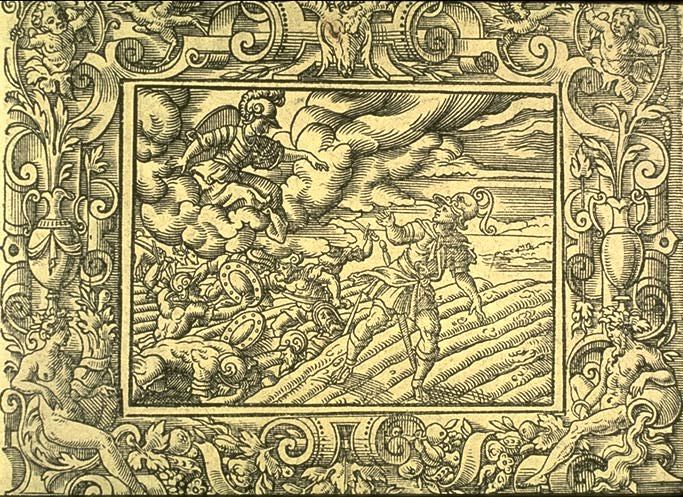 Cadmus was frightened when he saw the strange crop which had grown up from the dragon’s teeth. The men looked so fierce that he feared they would kill him if they saw him. He hid himself behind his plow and then began to throw stones at them. The warriors did not know where the stones came from, but each thought that his neighbor had struck him. Soon they began to fight among themselves. Man after man was killed, and in a little while only five were left alive. Then Cadmus ran towards them and called out:
Cadmus was frightened when he saw the strange crop which had grown up from the dragon’s teeth. The men looked so fierce that he feared they would kill him if they saw him. He hid himself behind his plow and then began to throw stones at them. The warriors did not know where the stones came from, but each thought that his neighbor had struck him. Soon they began to fight among themselves. Man after man was killed, and in a little while only five were left alive. Then Cadmus ran towards them and called out:
“Hold! Stop fighting! You are my men, and must come with me. We will build a city here.”
The men obeyed him. They followed Cadmus to the top of the hill; and they were such good workmen that in a few days they had built a house on the spot where the cow had lain down.
After that they built other houses, and people came to live in them. They called the town Cadmeia, after Cadmus who was its first king. But when the place had grown to be a large city, it was known by the name of Thebes.
Cadmus was a wise king. The Mighty Folk who lived with Jupiter amid the clouds were well pleased with him and helped him in more ways than one. After a while he married Harmonia, the beautiful daughter of Mars. All the Mighty Ones were at the wedding; and Athena gave the bride a wonderful necklace about which you may learn something more at another time.
But the greatest thing that Cadmus did is yet to be told. He was the first schoolmaster of the Greeks, and taught them the letters which were used in his own country across the sea. They called the first of these letters alpha and the second beta, and that is why men speak of the alphabet to this day. And when the Greeks had learned the alphabet from Cadmus, they soon began to read and write, and to make beautiful and useful books.
As for the maiden Europa, she was carried safe over the sea to a distant shore. She may have been happy in the new, strange land to which she was taken—I cannot tell; but she never heard of friends or home again. Whether it was really Jupiter in the form of a bull that carried her away, nobody knows. It all happened so long ago that there may have been some mistake about the story; and I should not think it strange if it were a sea robber who stole her from her home, and a swift ship with white sails that bore her away. Of one thing I am very sure: she was loved so well by all who knew her that the great unknown country to which she was taken has been called after her name ever since — Europe. (4)
SOURCES:
- Phædo: Or, The Immortality of the Soul By Plato
- The classical manual: an epitome of ancient geography, Greek and Roman … By James Skerret Shore Baird
- The scripture chronology demonstrated by astronomical calculations By Arthur Bedford
- Old Greek stories: third reader grade By James Baldwin

Moe is the founder of GnosticWarrior.com. He is a father, husband, author, martial arts black belt, and an expert in Gnosticism, the occult, and esotericism.

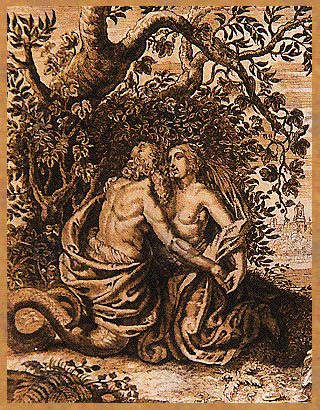

![How the same St. Cuthbert, living the life of an Anchorite, by his prayers obtained a spring in a dry soil, and had a crop from seed sown by the labour of his hands out of season [676 A.D.] | Book 4 | Chapter 28 How the same St. Cuthbert, living the life of an Anchorite, by his prayers obtained a spring in a dry soil, and had a crop from seed sown by the labour of his hands out of season [676 A.D.] | Book 4 | Chapter 28](https://www.gnosticwarrior.com/wp-content/plugins/contextual-related-posts/default.png)

